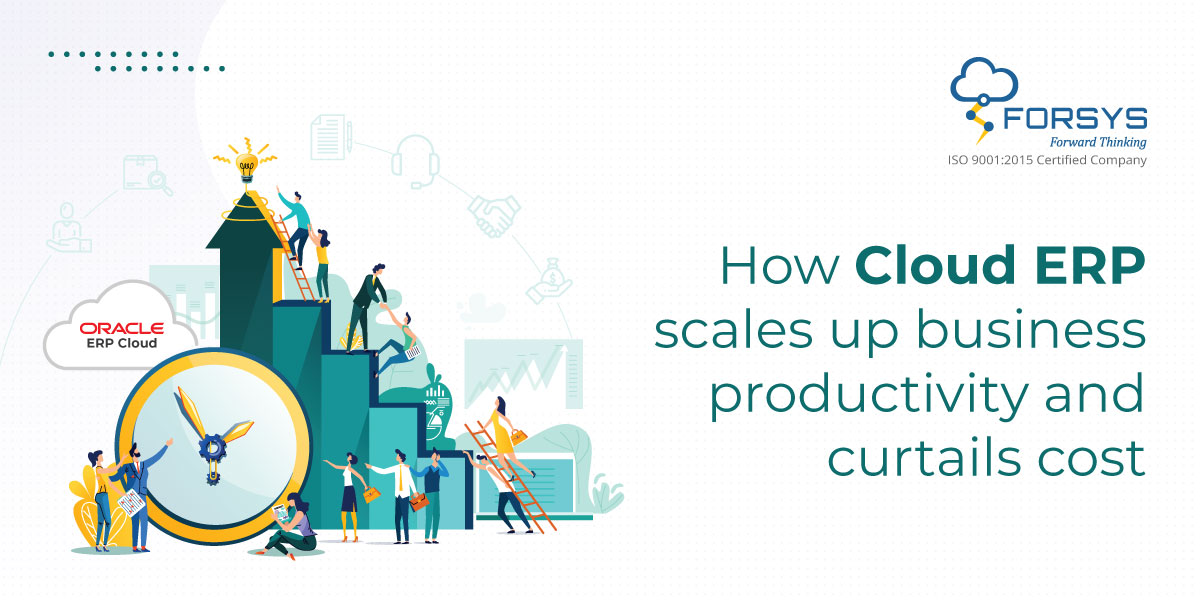Do you rely on the whiteboard to make your weekly business plans? Are you using KPIs to measure organizational performance? Do you store your business data in silos and need manual processing before it can be accessed by different business teams?
If your answer is a resounding ‘yes’ to these above questions, then it is time to make a smart investment in a cloud-based ERP solution to take the stress out of enterprise growth. In today’s rapidly transforming and increasingly competitive business atmosphere, businesses need complete enterprise-wide visibility, team collaboration ability, agility, and flexibility to swiftly respond to the changing market demands while bolstering business growth to maximize the full potential of new opportunities.
Below, we list out the different modules of Cloud ERP software and explain how it unlocks opportunities for business growth, expansion, cost reduction, and productivity jump.
Different modules of Cloud ERP Software
A cloud ERP software encompasses core financial and accounting functionality. However, the types of applications and modules an organization selects or opts for are dependent on its business needs and industry type. The varied components of a cloud ERP system include:
- Financials
- Customer relationship management (CRM)
- Inventory management
- Order management
- Procurement
- Human capital management (HCM) and/or Human resource management software (HRMS)
- Supply chain management
- Project management
- Material requirements planning (MRP)
Key advantages of using a Cloud ERP solution
- One of the benefits of choosing cloud ERP is that businesses can get up and running in no time as it doesn’t need to set up hardware, meaning any business downtime.
- The users are allowed access to business data from anywhere, anytime, and on any device. This signifies a cloud ERP solution is available to all business units, irrespective of where the employees are working, and provides an up-to-date and unified view of data.
- Scaling a business is easier with Cloud ERP without having to worry about increasing servers with the expansion of the user base, locations, or subsidiaries. Cloud ERP service providers have their own data centers where they store the customers’ data across varied locations.
- As per business requirements, it can be tailored (using plugins) as the business evolves and progresses. While on-premises also support customization, however, they can be difficult to reimplement, especially if the integrations took place in-house. This is one of the possible reasons why many businesses don’t prefer upgrading their on-premises ERP systems.
- Cloud ERP systems have proven to be a better choice when integration is considered with other cloud-based tools. Adding new modules to a cloud ERP system happens without any downtime or additional hardware, which allows an organization to maintain productivity.
- Cloud ERP solution providers manage system updates and upgrades on an ongoing basis to ensure that the growing business requirements are met and customers are up-to-date with the technological advancements. When updating/upgrading an on-premise ERP system, downtime is a major roadblock. Cloud ERP updates/upgrades require minimalistic time.
- Cloud ERP vendors have proven to offer better data security, compliance, and recovery compared to their on-premise counterparts.
Oracle Cloud ERP: Gain agility, speed, and value
It is widely recognized by customers for offering an extensive range of competencies such as material planning, financial accounting, general ledger capabilities, analytics, self-service reporting. The accounting features include a robust BI module that helps identify trends from enterprise data. Additionally, the billing department can access the payables and assets dashboard that enables them to reconcile statements, keep an eye on the supplier invoices and payments, account for fixed assets, and easily manage multiple bank accounts.
Oracle ERP supports the real-time updates of expenses as well. Since invoice imaging is integrated, it allows supplier invoices and other documents to be scanned and posted automatically. Below are some of its key features:
- Scalable: While offering security and ensuring compliance, it scales inherently. This has emerged as the most commonly used Cloud ERP solution for IT system simplification and to upgrade the latest features without compromising security.
- Secure: Oracle ERP Cloud’s vertically integrated stack ensures data security. It offers a set of flexible deployment options, data isolation capabilities, and end-to-end embassy-grade security. Also, it integrates the patching process into the cloud to ensure quick distribution and application of the latest security updates to curtail risks.
- Integrated approach: Since it is an integrated suite, data sharing is easy and quick. Apart from automation, this entire suite offers embedded social collaboration features, mobile capabilities, and API support as well.
- C-suite usually needs real-time data at the month-end/quarter-end data. In Cloud ERP, they can access these reports in real-time and don’t need to rely on other resources as compared to on-premises systems.
Looking for a trusted Oracle ERP Implementation Partner? Forsys can help! We are an Oracle Gold, Co-Development, and Cloud Excellence Implementation Partner, offering implementation services for Fusion Cloud ERP and Fusion Cloud SCM solutions. Talk to us to understand how your business can stay on the cutting edge with Cloud ERP.

